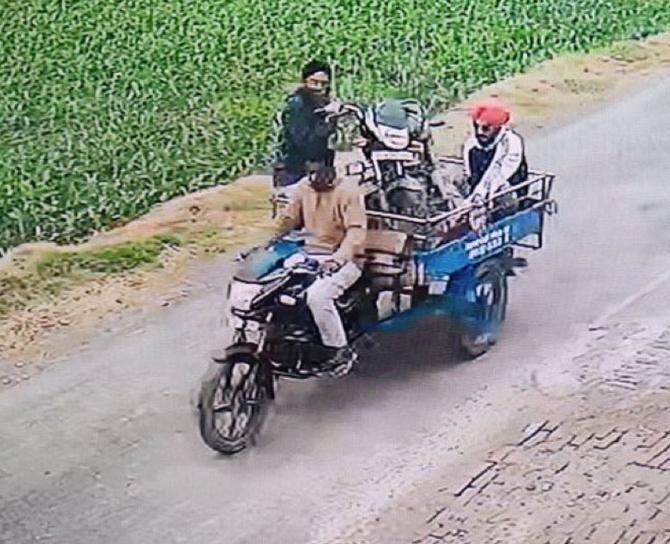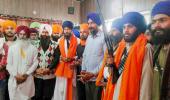'Amritpal is the creation of journalists and the inaction of the government in Punjab.'

"Almost half of Punjab has experienced 1984 and the turmoil of the 1980s-1990s. They have lived through this history.
"These people are not going to allow Khalistan to be made in Punjab. They know that the future lies with India," says Dr M Rajivlochan, professor of history, Punjab University.
Dr Rajivlochan has written several books and has deep insights into the socio-politico environment of Punjab.
In an interview to Rediff.com's Archana Masih and Nikhil Lakshman, Dr Rajivlochan traces the emergence of Punjab state and the demand for Khalistan that goes back to 1909.
You have said there is no support for Khalistan in Punjab. Why do you believe so?
Do you believe that anyone is going to interfere with the tremendous prosperity that Punjab has seen in the last few years?
This place where I live used to be a village a few years ago, but is a flourishing township now. These changes have happened in the last five to 10 years.
The soil quality of Punjab is poor and is not suitable for agriculture. Chandigarh perhaps has the poorest soil quality, but the city has boomed in the last 10-15 years.
In these circumstances, I don't see much support for Khalistan.
What is the genesis for a separate nation for Khalistan? When did the demand first appear?
Khalistanis have been around for a long time. The first demand for Khalistan was in 1909 or thereabouts. Some Punjabi authors were writing about Khalistan at that time in response to the creation of the Muslim League in 1906.
Muslims constituted 50% of the police force and 50% of the army which were the most paying professions in India, more paying than a small time lawyer in a district court.
The British imagined that Muslims were persecuted. W W Hunter, an ICS officer, wrote a book saying that the Muslims were ordained by their religion to rebel against the queen and the reason they rebelled was because she did not treat them as equal citizens. Brahmins were seen as equal citizens, hence, the government needed to make policies to make Muslims more equal.
The Congress rejects this proposal outright. And yet, the Congress found it very difficult to get Muslims to participate in Congress activities.
The three Bombay lawyers who are appointed presidents of the Congress were effectively boycotted by the rest of the community.
The English educated Muslim youth from Aligarh demanded a separate nation for Muslims. Jinnah did not believe in this and criticised it for 20 years. Parallel to this demand, came stray statements from Punjab where Sikh authors advocated that since Sikhism was also a separate religion, Sikhs should have a separate nation. No one paid any attention to them.

How did state politics shape and what was the status of the demand for Khalistan pre and post Independence?
The Shiromani Akali Dal was formed in 1925. The SAD said it would only deal with the culture of Punjab, but was involved in communal violence against Muslims between 1928-1931.
The Akali leader at that time was Baba Kharak Singh. Tara Singh, a school teacher, stepped in and said that the Akali Dal could not be party to such communal conflict.
Baba Kharak Singh went on to lose the election and the Akalis then moved from espousing culture to dabbling in politics.
The Akali Dal discovered that they represented the Sikhs and that the Sikhs are a separate people.
The 1919 India Act gave Sikhs separate electorates and the Akalis contested on Sikh seats. Partap Singh Kairon, who did not believe in this kind of politics, contested against Gurdit Singh, the biggest leader of the Congress in those days. Gurdit Singh was a rich contractor associated with purchasing the Komagata Maru [on which Indians attempted to reach Canada in 1914, but were forced to return].
The election was an important one and Jawaharlal Nehru made three visits asking people to vote for Gurdit Singh. Police reports say that lakhs of people came to see Nehru, but when the election results were announced, Gurdit Singh lost his deposit and Partap Singh Kairon won.
Kairon did not believe in communal politics and persisted with the belief that Sikhs were a part of India, but Tara Singh, who by now, had shifted sides insisted that Sikhs were a separate people.
Tara Singh said that the Sikhs would not participate in the Quit India movement and stand with the British because that was beneficial for them.
Pratap Singh Kairon disapproved of this view and left the Akali Dal.
Tara Singh demanded a separate nation. He came out of the Lahore assembly brandishing a sword demanding Khalistan. This led to communal riots in Punjab where Muslims attacked Hindus and Sikhs.
After Independence, Tara Singh realised that a separate nation was not going to be a reality, so he altered his stance and demanded a separate state for Sikhs.
The Congress continued with the same rhetoric that we should look after the aspirations of all. Along the same time the Arya Samajis and Santanis said that Hindi should be the official language of the state which resulted in opposition.
These are all written records, by the way, not oral history. There were 8 cabinet ministers in the state and Kairon told his cabinet colleagues that the chief minister [Bhim Sen Sachar, father of Justice Rajinder Sachar and Kuldip Nayar's father-in-law] was ineffective and creating conflict in Punjab by not taking any action.
Kairon stepped in and crushed the Akalis, Arya Samajis and Sanatanis. He won more than two thirds of the seats in the assembly election.
Tara Singh sat on a hunger strike for over 125 days to demand a Punjabi Suba. Finally, he had to give up the agitation and Jayaprakash Narayan stepped in to say that Sikh aspirations should be accommodated in the form of a separate state.
Kairon disagreed. Four-five years later, Indira Gandhi agreed to the Sikh Suba and Punjab was divided into three parts -- Punjab, Haryana and Himachal Pradesh.
Haryana and Himachal have prospered tremendously, but Punjab hasn't prospered as much. The state has started seeing and experiencing prosperity only now.
The people of Punjab have lived through this small history that I have just told you. Almost half of Punjab has experienced 1984 and the turmoil of the 1980s-1990s.
These people are not going to allow Khalistan to be made in Punjab. They know that the future lies with India.

What is the reason for Amritpal's rise in Punjab?
In the modern State an individual can't do anything to defend herself. People vote for someone to represent them and the elected person has to ensure that the state keeps everyone safe.
When the modern State fails to do that then there is nothing that a private individual can do. After the 1980s people in Punjab are wary about taking the law into their own hands.
Punjab is not a violent place. The gurus routinely tell us that there should be no violence and that one should have the capability to protect oneself, but not indulge in violence. There's a very strong element of non-violence in Sikhism.
But over the years, a new kinds of gun culture came about which demonstrated that the authorities of the state were incapable of taking action against those displaying weapons.
The Congress did not take any steps to stop this gun culture. There are YouTube videos of popular singers carrying weapons. A culture of violence was developing in Punjab that did not exist earlier.
There's a very fine difference between being capable of indulging in violence and actually being violent.
Violence was frowned upon even during Bhindranwale's time and was the reason why many left him and supported K P S Gill.
The gun culture started flourishing and videos were put up with impunity on YouTube. No action was ever taken. The environment was getting vitiated till COVID-19 put a stop to it two years ago.
But as soon as COVID was over, the culture of guns returned.

What do you think of Amritpal Singh's rise?
Amritpal comes in from nowhere and journalists start responding to him -- while the public doesn't.
Amritpal is the creation of journalists and the inaction of the government in Punjab.
The media says he is aping Bhindranwale and people are flocking to him.
The problem with all conspiracy theories is that whoever hatches the conspiracy can initiate it, but to move it forward, it requires a certain social base.
The conspirator can take the first step, but the second, third and fourth step is where the conspiracy starts showing social results. Those social results seem to be missing all over.
The Ajnala episode was televised and the Punjab police turned out to be completely incapable. The Punjab police has not captured Amritpal, but exposed his network and made 300 arrests.
There is no support for Khalistan in Punjab at all. That notion is strictly in the minds of the intellectuals from Delhi who are fixing European theories into the realities of Punjab.
Feature Presentation: Aslam Hunani/Rediff.com










